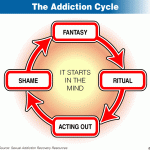Q. OK, so I’ve heard of sex addicts, the entertainment news is full of guys who have sought therapy for it. Are you saying that could be made worse by combining it with an internet addiction? Certainly you don’t mean that could be true for my adolescent son! I mean, he can’t be old enough for that, right?

A. It’s alarming, but we’re seeing this problem at younger and younger ages. It’s not at all strange to have a college-age man diagnosed with a sex addiction, and most of those young men are feeding their addiction with internet porn. The problem for these boys – and even in college, young men are still boys in many ways – is that they’re not getting sexual gratification from a real, live human being but from an image which may be real or not, and even if real may be the result of some force or coercion to make the people participate in creating that image or video. The problem with our brains is that we don’t actually have to experience an event for our minds to react as if we really did participate in that experience. An example: if you hold a pencil with your teeth, it makes your lips turn up as if in a smile; if you hold a pencil with your lips, it makes your lips turn down as if in a frown. Research has shown that simply holding a pencil with your teeth makes you feel a bit happier while holding a pencil with your lips can make you feel a bit sadder. We know that focusing on a mental image of an action makes your body feel that you actually have completed that action,which is one of the reasons that many athletes use mental imaging as part of their training for their sport. Therefore, simply watching pornography makes your brain think you have engaged in the act you are seeing, but you have no emotional connection to the people involved. That will distance you from the people in the image or film, but may become a part of the way you cope with people you encounter in real life, as well. So, the internet has made pornography both readily available and a way for people not to interact with each other. The risk here is that a young man can become literally addicted to the gratification he gets from watching internet pornography, which can distance him from interacting with people and developing healthy relationships. It’s critical to monitor your son’s internet activity when he’s in middle school and high school, and to talk to him about the risks of virtual relationships. Keep that conversation going even when he’s moved on to college, and pay attention to his behavior with his friends. Encourage your sons, at all ages, to regularly turn off the computer and get involved in healthy activities with real people.
